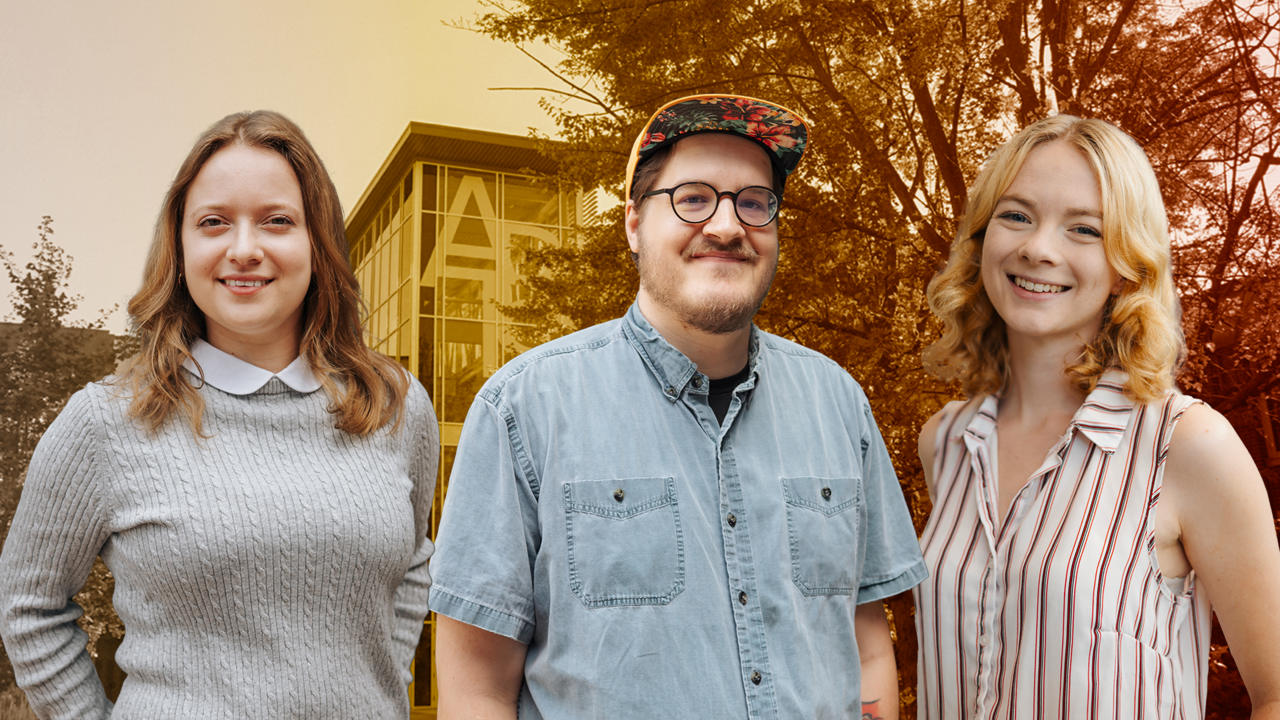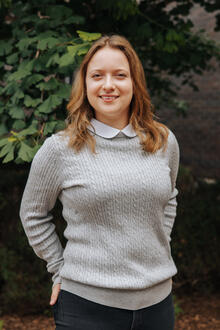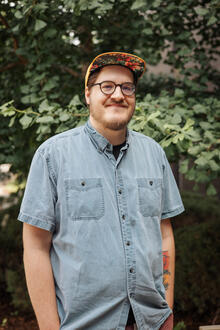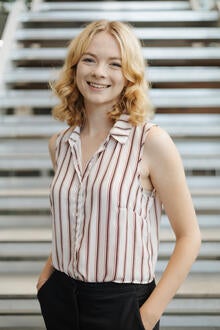
Navigating the narrative
Three unique journeys of Waterloo English grad students

Three unique journeys of Waterloo English grad students
By Zoe Tipper Faculty of ArtsThe University of Waterloo's Department of English is a hub of creativity and innovation, embodying a spectrum of master’s programs that accommodate the wide range of goals and interests of its students.
 Sophie Morgan, enrolled in the MA Rhetoric and Communication Design (RCD) program, has had her work recognized by the national SSHRC Canada Graduate Scholarship. With a research focus that merges code, literacy studies, and rhetoric, Sophie is combining the worlds of humanities and STEM.
Sophie Morgan, enrolled in the MA Rhetoric and Communication Design (RCD) program, has had her work recognized by the national SSHRC Canada Graduate Scholarship. With a research focus that merges code, literacy studies, and rhetoric, Sophie is combining the worlds of humanities and STEM.
Sophie’s research examines how the Ontario government frames code education and examines the implications of how it’s promoted. “Code is everywhere yet invisible in our everyday lives, so it is vital then that we understand how it is taught and framed.”
The interdisciplinary nature of Sophie’s program has allowed her to see that her work is not just about bridging humanities and STEM subjects, but about redefining the boundaries that confine them. “I want to encourage people to see code as not just math, but also as a form of writing, thinking, and problem solving with real-world, rhetorical possibilities.”
As she approaches graduation, Sophie is certain she made the right decision in choosing Waterloo for her graduate studies. “I look back and remember connecting with colleagues at the Games Institute, trading ideas with classmates, and chatting with friends at the Grad House. During all those moments, I felt connected to my research and my community, and I felt heard, supported, and encouraged.”
 Michael Veenstra, a student in the MA Literary Studies program, finds himself captivated by the universe of experimental literature. For Michael, the program serves as a window into how mental illness is portrayed in popular fantasy novels.
Michael Veenstra, a student in the MA Literary Studies program, finds himself captivated by the universe of experimental literature. For Michael, the program serves as a window into how mental illness is portrayed in popular fantasy novels.
“I’ve been reading fantasy my whole life, and as a neurodivergent person who has experienced mental health struggles, looking at how mental illness is portrayed felt like a built-in area of expertise,” he says. “It’s exciting to put fantasy under the microscope and examine how it both impacts and has been impacted by broader culture.”
As an out-of-town student commuting to campus, Michael says he still always felt like a part of the departmental community. “Between classes and TA-ing, I feel like I’ve gotten to know the community of English students on campus and it’s been really nice to be a part of.”
 In the MA Experimental Digital Media (XDM) program, Bella Goudie is more than just a student; she's a pioneer at the intersection of communication and ornithology – also known as the study of birds. In her research, Bella combines digital media and her love of birds to create a digital zine about the burrowing owl.
In the MA Experimental Digital Media (XDM) program, Bella Goudie is more than just a student; she's a pioneer at the intersection of communication and ornithology – also known as the study of birds. In her research, Bella combines digital media and her love of birds to create a digital zine about the burrowing owl.
“Most people think my research was about the owls, but actually it was about the design methodology and how I applied it to the zine,” says Bella. During her graduate studies, she took courses in Posthumanist and Value Sensitive Design where she learned about decentering the human experience and advocating for the consideration of all stakeholders to be equally represented.
Bella praises the XDM program for allowing students to tailor their research to what they’re passionate about. For Bella, this was making the world a better place for all species, something she highlights as very important during the current climate crisis. “My research helps to raise awareness about the many challenges facing the burrowing owl and looks at how we can learn to design for the species around us. We need to be critical in the ways we design because we shape the ways in which all beings engage with the world around them.”
As they look forward, each student is confident that their program equips them with the practical skills and theoretical knowledge needed for their respective career paths. Sophie has a final piece of advice for those considering graduate studies: “It’s so important to ask: what questions do you want to answer? What problems do you want to solve? When you answer those, everything else falls into place.”

Read more
Mackenzie Leclaire (MA ’23) challenges misconceptions and brings humanity to the forefront of her graduate research

Read more
MFA student's journey through art and activism highlights Black innovation, resiliency, and joy

Read more
Championing equity and connection, PhD student demonstrates the power of self-representation in Dungeons & Dragons
The University of Waterloo acknowledges that much of our work takes place on the traditional territory of the Neutral, Anishinaabeg, and Haudenosaunee peoples. Our main campus is situated on the Haldimand Tract, the land granted to the Six Nations that includes six miles on each side of the Grand River. Our active work toward reconciliation takes place across our campuses through research, learning, teaching, and community building, and is co-ordinated within the Office of Indigenous Relations.